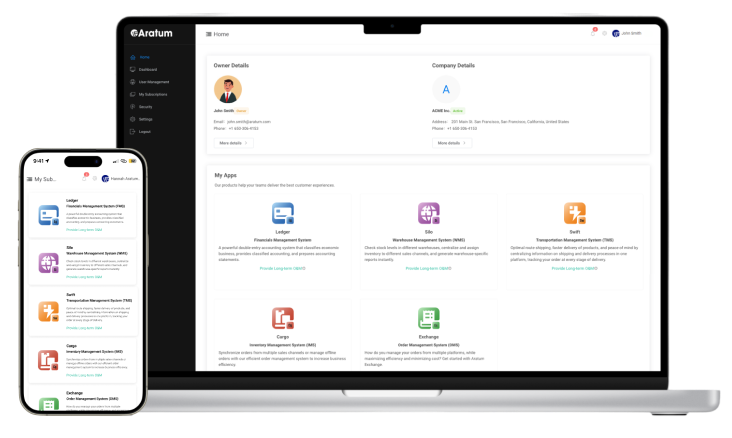AI and Machine Learning
Deploying AI technology and machine learning is now imperative in the complex world of supply chains. Aratum’s world-class AI infrastructure facilitates efficient data processing, advanced analytics, and automation to streamline every business management and process, from warehouse inventory and maintenance to employee safety and fast deliveries.
Grow your business to new heights and be at the top of the game with Aratum’s robust and scalable AI technology and machine learning infrastructure.
Key Features of AI Technology
Machine Learning
Generative AI
Natural Language Processing (NLP)
Robotics and Automation
Prediction and Forecasting
Facial Recognition
Autonomy
Machine Learning
Machine Learning is a deep learning infrastructure that develops algorithms and models that allow computers to learn from and make predictions or decisions based on data without being explicitly programmed for each task. As its name suggests, the machine learns independently based on the data it gathers.

Generative AI
Machine Learning is a deep learning infrastructure that develops algorithms and models that allow computers to learn from and make predictions or decisions based on data without being explicitly programmed for each task. As its name suggests, the machine learns independently based on the data it gathers.

Natural Language Processing (NLP)
Machine Learning is a deep learning infrastructure that develops algorithms and models that allow computers to learn from and make predictions or decisions based on data without being explicitly programmed for each task. As its name suggests, the machine learns independently based on the data it gathers.

Robotics and Automation
Machine Learning is a deep learning infrastructure that develops algorithms and models that allow computers to learn from and make predictions or decisions based on data without being explicitly programmed for each task. As its name suggests, the machine learns independently based on the data it gathers.

Prediction and Forecasting
Machine Learning is a deep learning infrastructure that develops algorithms and models that allow computers to learn from and make predictions or decisions based on data without being explicitly programmed for each task. As its name suggests, the machine learns independently based on the data it gathers.

Facial Recognition
Machine Learning is a deep learning infrastructure that develops algorithms and models that allow computers to learn from and make predictions or decisions based on data without being explicitly programmed for each task. As its name suggests, the machine learns independently based on the data it gathers.

Autonomy
Machine Learning is a deep learning infrastructure that develops algorithms and models that allow computers to learn from and make predictions or decisions based on data without being explicitly programmed for each task. As its name suggests, the machine learns independently based on the data it gathers.

Applications of AI Technology and Machine Learning Across Industries

Healthcare
AI technology and machine learning enhance medical imaging analysis, enabling faster, more accurate diagnosis of diseases like cancer from MRI, CT, and X-ray scans. They analyze patient data to predict disease risks, recommend treatments, and optimize medication dosages.

Retail
In pharmaceutical supply chains, AI and machine learning optimize inventory, forecast demand, and improve logistics. They ensure efficient resource allocation, timely medicine distribution, and proactive disruption identification, ensuring reliable supply chains for global healthcare needs.

Pharmaceuticals
In retail, AI technology and machine learning power personalized recommendations, demand forecasting, and inventory optimization. They analyze customer data, predict preferences, and optimize stock levels, driving sales and satisfaction.

E-Commerce and Fulfillment
In e-commerce, AI and machine learning power personalized recommendations, pricing optimization, and fraud detection. They analyze customer data, improving the shopping experience, boosting conversion rates, and reducing fraud risks.
Cold Chain
In cold chain management, AI and machine learning optimize temperature-controlled storage and transportation of perishable goods. They analyze sensor data, predict temperature changes, and offer real-time alerts, ensuring product safety throughout the supply chain.

Logistics and Transportation
AI technology and machine learning revolutionize logistics, optimizing routes and developing autonomous vehicles. They analyze data to enhance transportation efficiency, safety, and sustainability, advancing self-driving cars and automated delivery drones.

Manufacturing
AI technology and machine learning enhance production through predictive maintenance, quality control, and supply chain optimization. They analyze sensor data, reduce downtime and defects, improve efficiency, and lower costs for higher-quality products.
Cybersecurity
AI and machine learning are vital for threat detection, analyzing network data to identify and respond to cyber threats in real-time. They enhance security, safeguarding sensitive data from unauthorized access or compromise.
Dangerous Goods Warehouse
In dangerous goods warehouses, AI technology and machine learning enhance safety by analyzing sensor and camera data to detect hazards in real-time. They enable proactive risk mitigation and quick emergency response, ensuring personnel and environmental protection.
Government
In government, AI and machine learning detect fraud, automate tasks, and predict resource needs for public safety. They enhance efficiency and decision-making, improving public services and governance.
Successful
Case Study

Smoother & Faster Order Fulfillment Process
Due to the unexpected surge in sellers and shoppers on its platform, a growing Finland-based e-commerce marketplace needed help optimizing its order fulfillment processes. The company’s daily operations have been complex and time-consuming for its employees, exacerbated by the need to train new staff adequately. Consequently, their employees became overworked, and some became sick.
In response to these challenges, the e-commerce marketplace sought our solutions to optimize its operations.
After implementing Aratum Horizons’ AI and machine learning applications, the company:
- Integrated their in-house ERP systems with couriers and applications for faster deliveries and better marketing strategies
- Improved operational visibility and customer demand predictions
- Enhanced operational efficiency and productivity of employees
- Improved partner relations and customer service
Improved Customer Reviews
Increased their customer and seller base
Enhanced productivity, autonomy, and happiness in their employees
Frequently Asked Questions
1. What is Artificial Intelligence (AI)?
Artificial intelligence (AI) refers to developing computer systems that can perform tasks that typically require human intelligence, such as learning, reasoning, problem-solving, perception, and language understanding. AI technology can assist humans in solving problems in real-life scenarios like supply chain management.
2. What is Machine Learning?
Machine learning is a subset of AI that involves the development of algorithms and models that enable computers to learn from and make predictions or decisions based on data without being explicitly programmed for each task.
3. What is the difference between AI technology and machine learning?
AI technology is a broader concept encompassing any technique that enables computers to mimic human intelligence. At the same time, machine learning is a specific approach within AI that focuses on allowing computers to learn from data and make predictions or decisions.
4. How do AI and machine learning improve supply chain management?
AI and machine learning improve supply chain management by analyzing large volumes of data to identify patterns, trends, and insights that enable better forecasting, inventory optimization, demand planning, and risk mitigation.
5. What are some specific applications of AI technology and machine learning in supply chain technology?
Specific applications of AI and machine learning in supply chain technology include demand forecasting, predictive maintenance for equipment and machinery, route optimization for transportation, automated inventory management, and supplier risk management.
6. How do AI and machine learning enhance demand forecasting in supply chains?How do AI and machine learning enhance demand forecasting in supply chains?
AI technology and machine learning enhance demand forecasting by analyzing historical sales data, market trends, weather patterns, and other relevant factors to predict future demands more accurately. The technologies enable businesses to optimize production and inventory levels to meet customer demand while minimizing excess inventory and stockouts.
7. What role do AI and machine learning play in inventory optimization?
AI and machine learning play a crucial role in inventory optimization. They analyze demand patterns, lead times, seasonality, and other factors to determine the optimal inventory levels at different supply chain stages. They help reduce carrying costs, minimize stockouts, and improve inventory management efficiency.
8. How can AI and machine learning improve supply chain visibility and transparency?
AI technology and machine learning improve supply chain visibility and transparency by integrating data from multiple sources, such as sensors, IoT devices, and enterprise systems, to provide real-time insights into inventory levels, order statuses, and shipment tracking. AI and machine learning enable better decision-making and proactive supply chain operations management.
9. What are the challenges associated with AI and machine learning?
Some challenges of implementing AI and machine learning in supply chain technology include data quality and availability issues, integration with existing systems and processes, the need for specialized skills and expertise, and concerns about data privacy and security.
10. How can businesses use AI and machine learning?
Businesses can leverage AI and machine learning to mitigate supply chain risks by analyzing historical data, identifying potential risk factors, and predicting the likelihood and impact of disruptions such as natural disasters, supplier failures, or geopolitical events. AI technology and machine learning enable proactive risk management strategies and contingency planning to minimize the impact of disruptions on supply chain operations.
Get Started Today

To implement AI technology and machine learning in your supply chain, you can rely on Aratum’s artificial intelligence services to help you get started and gain business visibility, efficiency, and resiliency.
Aratum is a globally recognized software provider specializing in developing supply chain management solutions. Our software solutions incorporate advanced algorithms and optimized data structures to facilitate efficient data processing and information dissemination across organizations.
Leveraging cutting-edge technologies such as machine learning and artificial intelligence, the software enables automated decision-making and real-time analytics, enhancing supply chain visibility and improving overall performance. With a focus on delivering robust and scalable solutions, Aratum is committed to providing our clients with the tools necessary to optimize their supply chain operations and gain a competitive edge in your respective markets.
Trusted by businesses of all sizes








